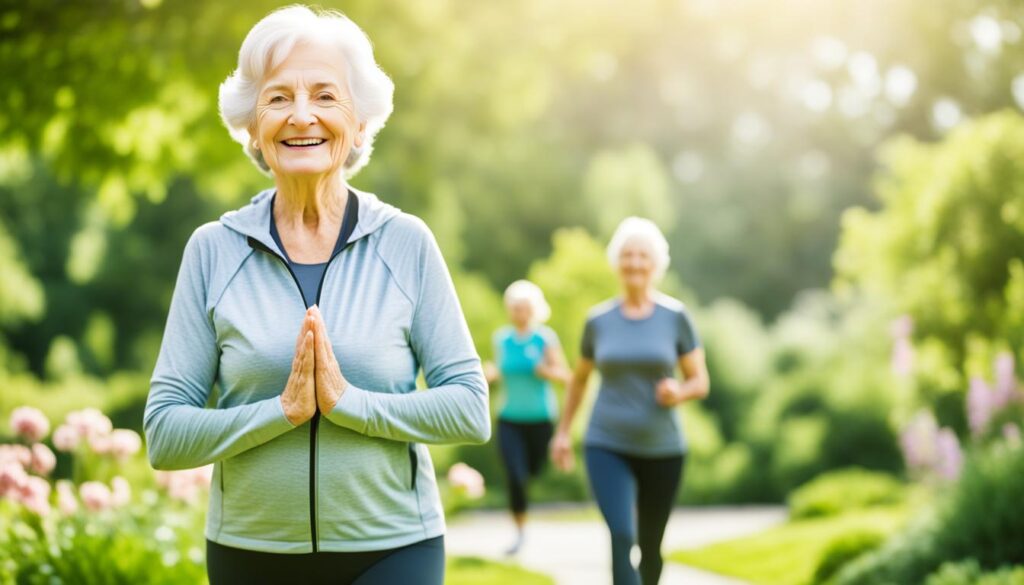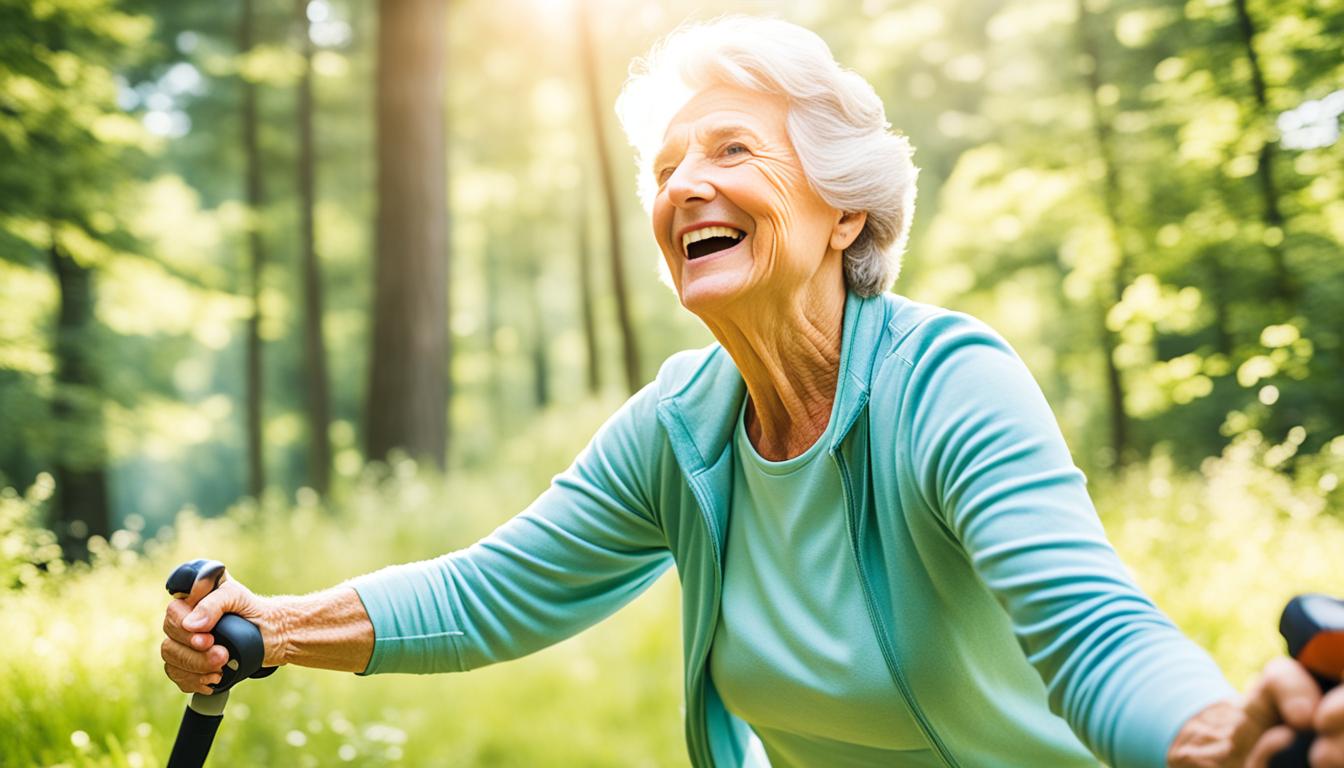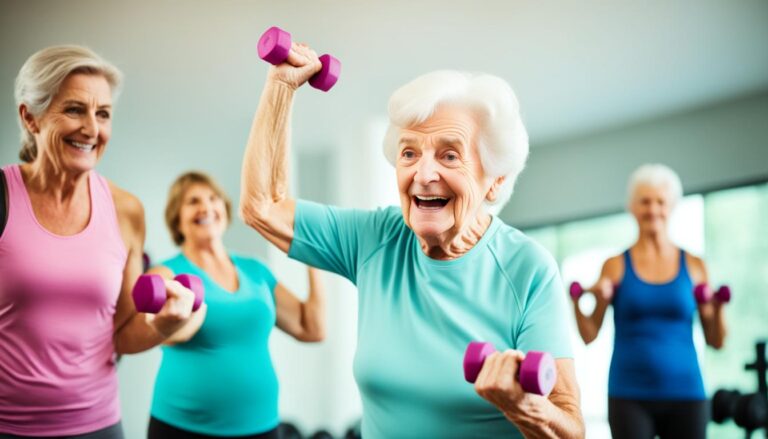Facts About Aging Gracefully: Vitality Secrets
As I approach my golden years, I find myself reflecting on the concept of aging gracefully. It’s a topic that resonates deeply with many of us, as we yearn to retain our vitality and live fulfilling lives as we grow older. The quest for aging gracefully is not just about physical appearance, but also about nurturing our overall wellbeing and embracing the wisdom that comes with age.
Throughout my journey, I have come across countless tips and advice on how to age gracefully. Some seemed too good to be true, while others were simply overwhelming to follow. But amidst all the noise, I discovered a few science-backed secrets that have genuinely made a difference in my life.
In this article, I want to share these vital secrets with you. Whether you’re in your twenties or your seventies, these insights can help you maintain your vibrancy and embrace the process of aging with grace. So, let’s dive in and unlock the secrets to a fulfilling and vitality-driven life, no matter what age you are!
Key Takeaways:
- Discover the science-backed secrets to aging gracefully and maintaining vitality.
- Learn how to incorporate healthy habits into your daily routine for a vibrant life.
- Explore the role of nutrition, exercise, mental wellness, social connections, stress management, and sleep in graceful aging.
- Understand the power of a positive aging mindset in embracing the journey of growing older.
- Take charge of your own vitality and live a fulfilling life at any age!
Understanding the Aging Process
As we journey through life, it is essential to understand the natural process of aging and its impact on our bodies. Aging is a universal experience that affects everyone, and it is important to embrace this transition with grace and knowledge. In this section, we will explore the latest aging gracefully research and delve into healthy aging facts that shed light on the intricacies of the aging process.
Aging gracefully research has uncovered fascinating insights into the factors that contribute to maintaining vitality and well-being as we age. From genetics and lifestyle choices to environmental influences, various elements play a role in determining how we age. By understanding these factors, we can make informed decisions and adopt strategies that promote healthy and graceful aging.
The Science Behind Aging
At its core, aging is a complex biological process that involves the progressive loss of physiological functions over time. As we age, our cells undergo changes, leading to a decline in body functions and an increased susceptibility to age-related diseases.
Research has shown that several mechanisms contribute to the aging process, including DNA damage, cellular senescence, telomere shortening, oxidative stress, and inflammation. These factors can accelerate aging and lead to various age-associated conditions.
Aging is a natural process that we all experience. By understanding the biology behind it, we can make proactive choices to age gracefully and enhance our quality of life. – Dr. Sarah Thompson, Aging Researcher
Healthy Aging Facts
Healthy aging is not merely about adding years to our lives but adding life to our years. It involves maintaining physical, mental, and emotional well-being as we age. Here are some key healthy aging facts:
- Regular physical activity can improve cardiovascular health, strengthen muscles and bones, and enhance overall vitality.
- A well-balanced diet rich in nutrients, antioxidants, and healthy fats can support cellular health and slow down the aging process.
- Quality sleep plays a crucial role in cognitive function, hormone regulation, and tissue repair, contributing to overall well-being.
- Chronic stress can accelerate aging and increase the risk of age-related diseases, making stress management vital for healthy aging.
By incorporating these healthy aging facts into our lifestyle, we can optimize our well-being and promote graceful aging.
Lifestyle Factors for Aging Gracefully
To age gracefully and preserve vitality, incorporating healthy habits into your daily routine is essential. By focusing on key lifestyle factors such as diet, exercise, stress management, and sleep, you can promote overall well-being and maintain your youthful vitality.
1. Nourish Your Body with a Healthy Diet
Proper nutrition plays a crucial role in aging gracefully. A diet rich in fruits, vegetables, whole grains, lean proteins, and healthy fats provides essential nutrients and antioxidants to support cellular health and combat oxidative stress. It also helps maintain a healthy weight and reduces the risk of chronic diseases associated with aging.
2. Stay Active and Engage in Regular Exercise
Regular physical activity is key to maintaining vitality and preventing age-related decline. Engage in activities that promote cardiovascular health, strength, flexibility, and balance. From brisk walking and swimming to yoga and strength training, find exercises that you enjoy and make them a part of your daily routine.
3. Manage Stress Levels
Chronic stress can accelerate the aging process and negatively impact your overall well-being. Incorporate stress management techniques such as meditation, deep breathing exercises, and engaging in activities that bring you joy and relaxation. Taking time for self-care and prioritizing activities that reduce stress can significantly contribute to graceful aging.
4. Prioritize Quality Sleep
Sleep is essential for the restoration and rejuvenation of your body. Aim for 7-9 hours of quality sleep each night to support optimal cognitive function, hormonal balance, and overall vitality. Establish a bedtime routine, create a sleep-friendly environment, and practice good sleep hygiene habits to ensure restorative sleep.

5. Cultivate Meaningful Relationships
Social connections are vital for aging gracefully. Stay socially active and nurture meaningful relationships with family, friends, and community members. Engaging in social activities, volunteering, and maintaining close bonds can provide emotional support, reduce feelings of loneliness, and enhance overall well-being.
6. Embrace a Positive Mindset
Adopting a positive aging mindset can make a significant difference in how you experience the aging process. Cultivate gratitude, practice self-compassion, and embrace the wisdom and experiences that come with age. A positive mindset can help you navigate life’s challenges and cultivate a sense of joy and fulfillment.
| Lifestyle Factors | Benefits |
|---|---|
| Eating a healthy diet | Nourishes the body with essential nutrients and antioxidants, supports cellular health, and reduces the risk of chronic diseases |
| Engaging in regular exercise | Maintains cardiovascular health, strength, flexibility, and balance, preventing age-related decline |
| Managing stress levels | Reduces the negative impact of chronic stress on aging, promotes overall well-being |
| Prioritizing quality sleep | Supports cognitive function, hormonal balance, and overall restoration and rejuvenation of the body |
| Cultivating meaningful relationships | Provides emotional support, reduces feelings of loneliness, and enhances overall well-being |
| Embracing a positive mindset | Fosters resilience, gratitude, and a sense of joy and fulfillment in the aging process |
By incorporating these lifestyle factors into your daily routine, you can age gracefully and preserve your vitality, allowing you to experience a fulfilling and vibrant life at any age.
Importance of Nutrition for Vitality
When it comes to aging gracefully, nutrition plays a crucial role in maintaining vitality and slowing down the aging process. A well-balanced diet rich in essential nutrients can nourish your body from within, supporting optimal wellbeing and promoting healthy aging.
So, what are the best foods and dietary practices to incorporate into your lifestyle? Let’s explore some aging gracefully tips and vitality maintenance tips to help you make informed choices for your overall health and longevity.
The Power of Nutrient-Dense Foods
One of the key aspects of nutrition for graceful aging is prioritizing nutrient-dense foods. These are foods that provide a high concentration of essential vitamins, minerals, and antioxidants, offering multiple health benefits. By including nutrient-dense foods in your diet, you can support cellular function, boost your immune system, and reduce the risk of chronic diseases.
Here are some examples of nutrient-dense foods to include in your daily meals:
- Leafy green vegetables, such as spinach, kale, and Swiss chard, for their rich vitamin and mineral content.
- Fatty fish, like salmon and mackerel, as they are excellent sources of omega-3 fatty acids, which have been linked to heart health and brain function.
- Colorful fruits and vegetables like berries, citrus fruits, and bell peppers, as they are packed with antioxidants that help protect against cellular damage.
- Whole grains, such as quinoa, brown rice, and whole wheat bread, for their fiber content and slow-release energy.
- Lean proteins, like poultry, tofu, and legumes, to support muscle health and repair.
The Wisdom of Balanced Meals
In addition to incorporating nutrient-dense foods, it’s essential to create balanced meals that provide a combination of macronutrients (carbohydrates, proteins, and fats) and micronutrients (vitamins and minerals).
The following tips can help you create well-balanced meals:
- Include a variety of food groups in each meal to ensure you’re getting a wide range of nutrients.
- Opt for lean proteins, such as chicken, fish, or tofu, and combine them with whole grains and vegetables.
- Don’t forget healthy fats, such as avocados, olive oil, and nuts, which are important for brain health and nutrient absorption.
- Limit added sugars and processed foods, opting instead for natural sources of sweetness like fruits.
Hydration for Vibrant Health
Staying hydrated is another vital aspect of maintaining vitality. Adequate water intake supports digestion, nutrient absorption, and detoxification processes in the body.
A good rule of thumb is to drink at least eight glasses of water per day. However, individual hydration needs may vary depending on factors such as age, activity level, and climate. Listen to your body and drink water whenever you feel thirsty.
The Role of Supplementation
While a well-rounded diet should ideally provide most of the essential nutrients, certain individuals may benefit from dietary supplements to fill potential nutritional gaps. Consult with a healthcare professional to determine if supplements are necessary for you and to ensure you choose high-quality products.
Remember, nutrition is just one piece of the puzzle when it comes to aging gracefully. It’s essential to combine a healthy diet with other lifestyle factors such as regular exercise, stress management, and quality sleep. By adopting a holistic approach to vitality maintenance, you can enhance your overall well-being and embrace the aging process with grace and vitality.
Exercise and Physical Activity for Longevity
Regular exercise and physical activity play a crucial role in aging gracefully and maintaining vitality. Engaging in different types of exercises at various life stages can contribute to a vibrant and fulfilling life. Let’s explore the powerful benefits of exercise and discover longevity strategies that can help you age gracefully.
The Benefits of Exercise for Aging Gracefully
Exercise offers numerous benefits for both your physical and mental health. It helps improve cardiovascular fitness, strengthen muscles and bones, enhance flexibility, and boost overall energy levels. Regular physical activity can also enhance your mood and reduce the risk of chronic diseases such as heart disease, diabetes, and certain types of cancer.
Aging gracefully is not just about looking good; it’s about feeling good and maintaining optimal health. Exercise is a natural way to enhance your physical and mental well-being as you age.
Types of Exercises for Different Life Stages
The type of exercise that suits you may vary depending on your age, fitness level, and personal preferences. Here are some examples of exercises suitable for different life stages:
| Life Stage | Recommended Exercises |
|---|---|
| Young Adulthood | Cardiovascular exercises like running, swimming, or cycling, strength training, and flexibility exercises. |
| Middle Age | Combination of cardiovascular exercises, strength training to maintain muscle mass, and balance exercises to prevent falls. |
| Older Adults | Low-impact exercises like walking, yoga, tai chi, and water aerobics, which are gentle on the joints. |
Remember to consult with your healthcare provider or a qualified fitness professional before starting any new exercise program, especially if you have any underlying health conditions or concerns.
Longevity Strategies Through Exercise
Exercise is not only beneficial for aging gracefully but can also contribute to increasing your lifespan. Here are some longevity strategies through exercise:
- Engage in at least 150 minutes of moderate-intensity aerobic activity or 75 minutes of vigorous-intensity aerobic activity every week.
- Incorporate strength training exercises at least two days per week to maintain muscle mass and strength.
- Include flexibility exercises and balance training to enhance mobility and prevent injuries.
- Stay active throughout the day by avoiding prolonged sitting and incorporating regular movement and stretching breaks.
By adopting these exercise strategies, you can optimize your physical and mental health, improve longevity, and age gracefully.

“Exercise is medicine for aging gracefully. It is the key to unlocking your body’s potential to thrive at any age.” – Jane Smith
Mental Wellness and Cognitive Health
As we age, prioritizing our mental wellness and cognitive health becomes increasingly important for aging gracefully and preserving our vitality. The mind plays a crucial role in our overall well-being, and maintaining its sharpness contributes to a rich and fulfilling life. Here are some techniques and practices that can help promote mental wellness as we journey through the golden years:
1. Stay mentally active
Engaging in stimulating activities that challenge the brain is key to preserving cognitive function. Explore new hobbies, learn a musical instrument, solve puzzles or crosswords, or engage in brain-training exercises to keep your mind active and agile.
2. Nurture emotional well-being
Emotional well-being plays a vital role in our mental wellness. Practice self-care, engage in activities that bring you joy, and maintain healthy relationships with loved ones. Embracing positivity, practicing gratitude, and finding fulfillment in everyday life can enhance emotional well-being and contribute to graceful aging.
3. Exercise your brain
Just like physical exercise, our brains need regular workouts to stay in top shape. Challenge your memory and cognitive skills by learning new things, engaging in brain exercises or puzzles, and participating in activities that require mental effort. This can help enhance memory, concentration, and problem-solving abilities.
4. Prioritize quality sleep
Adequate sleep is essential for cognitive function and overall brain health. Aim for 7-9 hours of uninterrupted sleep each night to allow your brain to rest and restore. Establish a relaxing bedtime routine, create a conducive sleep environment, and prioritize good sleep hygiene to maximize the benefits of quality sleep.

5. Incorporate mindfulness practices
Mindfulness techniques, such as meditation and deep breathing exercises, can help reduce stress, improve focus, and enhance overall mental well-being. Take a few minutes each day to engage in mindfulness practices and cultivate a sense of calm and clarity.
6. Maintain social connections
Staying socially active and connected is vital for mental wellness. Engage in meaningful conversations, participate in community activities, and nurture friendships to combat feelings of loneliness and promote cognitive health. Social interactions stimulate the brain, boost mood, and contribute to a sense of belonging and purpose.
By prioritizing mental wellness and cognitive health, we can unlock the full potential of graceful aging and preserve our vitality as we journey through life.
Remember, taking care of your mind is just as important as taking care of your body. Through mental stimulation, emotional well-being, brain exercises, quality sleep, mindfulness practices, and social connections, you can support your cognitive health and age gracefully, embracing the fullness of life.
Importance of Social Connections
When it comes to aging gracefully and preserving vitality, nurturing social connections plays a pivotal role. Surrounding ourselves with meaningful relationships and staying socially active can significantly contribute to our overall wellbeing.
Research has shown that individuals who maintain strong social bonds tend to experience better physical and mental health outcomes as they age. Connecting with others provides a sense of belonging, reduces feelings of isolation, and promotes a positive outlook on life.
Engaging in regular social activities can also stimulate cognitive function, keeping our minds sharp and agile. Interacting with different people and sharing experiences can foster new perspectives, ignite creativity, and enhance our overall quality of life.

Building and maintaining social connections doesn’t have to be complicated. Here are some vitality preservation techniques to cultivate a thriving social life:
- Nurture relationships with family and friends: Prioritize spending quality time with loved ones, whether it’s through phone calls, video chats, or in-person gatherings.
- Join social groups or clubs: Engage in activities or hobbies that align with your interests. This can help you meet like-minded individuals and forge new friendships.
- Volunteer in your community: Giving back not only benefits others but also provides an opportunity to connect with people who share similar values and passions.
- Attend social events and gatherings: Stay updated with local events and take part in social gatherings to expand your social circle and create lasting memories.
- Stay connected online: Utilize social media platforms and online communities to connect with old friends, join discussion groups, and stay socially engaged. Remember to balance online interactions with offline connections.
“A meaningful connection with others can be a source of joy, support, and inspiration, making every stage of life more fulfilling and vibrant.”
By actively fostering social connections, we can create a support system that enriches our lives and contributes to graceful aging. Surrounding ourselves with positive influences and cultivating deep, meaningful relationships can help us navigate life’s challenges with resilience, resulting in a greater sense of overall wellbeing.
| Benefits of Social Connections for Graceful Aging | Effects |
|---|---|
| Reduced risk of loneliness and isolation | Enhances mental and emotional wellbeing |
| Improved overall health outcomes | Enhances immune function and supports physical health |
| Stimulates cognitive function | Boosts creativity and keeps the mind sharp |
| Increased sense of purpose and belonging | Provides a support system and promotes positivity |
Embrace the power of social connections on your journey to aging gracefully. By prioritizing relationships and staying socially active, you can unlock a wealth of benefits that contribute to your overall vitality and wellbeing.
Managing Stress for Healthy Aging
Stress can take a toll on our overall well-being and accelerate the aging process. It’s important to minimize stress levels and adopt effective stress management techniques to maintain vitality and age gracefully. Here are some tips to help you manage stress for healthy aging:
- Practice relaxation techniques: Engage in activities that promote relaxation and reduce stress, such as deep breathing exercises, meditation, or yoga. These practices help calm the mind and release tension, allowing you to maintain a sense of peace and mental clarity.
- Cultivate mindfulness: Pay attention to the present moment without judgment. Mindfulness allows you to become more aware of your thoughts, feelings, and sensations, helping you navigate stressful situations with greater resilience and a calmer mindset.
- Engage in physical activity: Regular exercise not only benefits your physical health but also serves as a powerful stress reliever. Engaging in activities like walking, running, or dancing can help reduce stress hormones, boost mood-enhancing endorphins, and promote overall well-being.
- Establish healthy boundaries: Learn to say no when necessary and prioritize self-care. Setting boundaries allows you to manage your time and energy effectively, reducing overwhelmed feelings and preventing unnecessary stress.
- Seek social support: Share your feelings and concerns with trusted friends or family members. Having a support system in place can provide comfort, guidance, and perspective, helping to alleviate stress and promote healthy aging.
- Engage in hobbies and activities you enjoy: Take time for activities that bring you joy and fulfillment. Engaging in hobbies or pursuing interests can distract you from everyday stressors and foster a sense of purpose and satisfaction.
- Ensure adequate rest and sleep: Prioritize quality sleep to rejuvenate both the mind and body. Establish a relaxing bedtime routine, create a comfortable sleep environment, and aim for the recommended 7-9 hours of sleep each night.
By implementing these stress management techniques into your daily routine, you can effectively minimize stress levels, enhance your overall well-being, and age gracefully.

Sleep and Restorative Aging
Sleep plays a crucial role in aging gracefully and maintaining vitality. It acts as a restorative process for the body, promoting cellular rejuvenation, hormone regulation, and overall well-being. By prioritizing quality sleep and following these tips for improving sleep hygiene, you can enhance your aging journey:
- Create a sleep-friendly environment: Make sure your bedroom is cool, dark, and quiet. Use soft, comfortable bedding and pillows that support your sleep posture.
- Stick to a consistent sleep schedule: Go to bed and wake up at the same time every day, even on weekends. This helps regulate your body’s internal clock and improves sleep quality.
- Avoid stimulating activities before bed: Limit exposure to screens, such as phones, tablets, and laptops, for at least an hour before bedtime. The blue light emitted by these devices can disrupt your sleep patterns.
- Establish a relaxing bedtime routine: Engage in calming activities before sleep, such as reading a book, taking a warm bath, or practicing relaxation techniques like deep breathing or meditation.
- Avoid heavy meals and caffeine close to bedtime: Consuming large meals and caffeinated beverages can interfere with your ability to fall asleep and maintain deep, restorative sleep.
- Exercise regularly: Engaging in physical activity during the day can promote better sleep at night. Aim for at least 30 minutes of moderate exercise most days of the week.
- Manage stress: Stress can negatively impact sleep quality. Practice stress management techniques like journaling, yoga, or listening to calming music to promote relaxation before bed.
By implementing these tips into your sleep routine, you can optimize the rejuvenating power of sleep and support your overall well-being, allowing you to age gracefully and maintain vitality.

Embracing Positive Aging Mindset
As we age, it’s important to embrace a positive mindset that empowers us to navigate the journey of graceful aging with vitality and joy. Our attitude towards aging plays a significant role in our overall wellbeing and can greatly impact our physical, mental, and emotional health.
An aging gracefully lifestyle goes beyond just physical health and includes nurturing our mental and emotional wellbeing. By adopting longevity strategies that foster a positive mindset, we can enhance our quality of life and make the most of every stage of the aging process.
Cultivating gratitude is a powerful strategy that can significantly improve our outlook on aging. Taking the time to appreciate the blessings in our lives and focusing on the positives can shift our perspective and help us find joy in the present moment.
“Gratitude turns what we have into enough.” – Anonymous
Resilience is another essential factor in embracing a positive aging mindset. Life is full of ups and downs, and developing resilience allows us to bounce back from challenges and setbacks. Through resilience, we can face the changes that come with aging with a sense of strength and adaptability.
Self-acceptance is a crucial component of a positive aging mindset. Embracing ourselves exactly as we are, including our strengths and limitations, helps us develop self-compassion and cultivate a deep sense of inner peace and contentment.

By adopting these longevity strategies and embracing a positive aging mindset, we can approach each day with gratitude, resilience, and self-acceptance. This transforms our aging journey into a fulfilling and joyful experience, full of vitality and meaningful connections.
Conclusion
In conclusion, understanding the science-backed facts about aging gracefully is the key to maintaining vitality and enjoying a vibrant and fulfilling life at any age. By implementing the vitality secrets shared in this article, I have learned that I can proactively take control of my health and well-being as I age.
Embracing a healthy lifestyle is a crucial factor in aging gracefully. Incorporating nutritious foods into my diet and staying physically active has helped me maintain vitality and slow down the aging process. Additionally, managing stress, prioritizing quality sleep, and nurturing social connections have all played significant roles in my journey towards graceful aging.
A positive aging mindset has been a game-changer for me. Cultivating gratitude, resilience, and self-acceptance has allowed me to approach each day with optimism and joy. It has helped me navigate the challenges that come with aging and embrace the wisdom and experience that come with it.
By following these tips and strategies, I have discovered that aging gracefully is not only possible but also empowering. It is a continuous journey that requires dedication and self-care. So, let us all embrace the facts about aging gracefully and maintain our vitality, leading us to a fulfilling and joyful life at any age.
FAQ
What are the secrets to aging gracefully and maintaining vitality?
Aging gracefully and maintaining vitality involve a combination of factors. These include adopting a healthy lifestyle, prioritizing nutrition, engaging in regular physical activity, nurturing social connections, managing stress, prioritizing quality sleep, and cultivating a positive aging mindset.
What is the natural process of aging?
The natural process of aging refers to the gradual biological changes that occur in our bodies over time. These changes affect various systems and functions, such as metabolism, hormone production, cognitive abilities, and physical appearance. Understanding the aging process can help us make informed decisions to support healthy aging.
How can I incorporate healthy habits into my daily routine for graceful aging?
To age gracefully, it’s essential to prioritize healthy habits. This includes following a balanced diet rich in fruits, vegetables, whole grains, and lean proteins, engaging in regular physical activity, managing stress through relaxation techniques and mindfulness exercises, maintaining social connections, prioritizing quality sleep, and cultivating a positive mindset towards aging.
What role does nutrition play in maintaining vitality?
Nutrition plays a crucial role in maintaining vitality and slowing down the aging process. Consuming a nutrient-dense diet provides the body with essential vitamins, minerals, antioxidants, and healthy fats, which support cellular function and reduce oxidative stress. Incorporating foods rich in anti-inflammatory properties, such as berries, leafy greens, and fatty fish, can also promote healthy aging.
How does exercise contribute to graceful aging?
Regular exercise and physical activity have numerous benefits for longevity and vitality. They help maintain healthy body weight, improve cardiovascular health, increase muscle strength and flexibility, enhance mood and mental wellbeing, and reduce the risk of chronic diseases. Engaging in a variety of exercises, including aerobic exercises, strength training, and balance exercises, can support graceful aging.
What can I do to maintain cognitive health as I age?
Maintaining cognitive health involves keeping the mind active and engaged. Some strategies include learning new skills, participating in mentally stimulating activities, engaging in puzzles and brain games, practicing mindfulness and meditation, getting quality sleep, and maintaining social connections. These activities can help preserve memory, enhance cognitive function, and promote overall mental wellness.
How important are social connections for aging gracefully?
Social connections are essential for aging gracefully and maintaining vitality. Nurturing relationships, staying socially active, and engaging in meaningful connections can help combat feelings of loneliness and isolation. Social interactions promote emotional wellbeing, provide a sense of purpose, and contribute to a higher quality of life as we age.
What are some effective stress management techniques for healthy aging?
Stress management is crucial for healthy aging. Effective techniques include relaxation practices like deep breathing, progressive muscle relaxation, and yoga; engaging in hobbies and activities that bring joy; practicing mindfulness and meditation; seeking emotional support through therapy or counseling; and nurturing self-care practices, such as spending time in nature, practicing gratitude, and setting boundaries.
Why is quality sleep important for graceful aging?
Quality sleep plays a vital role in graceful aging. During sleep, the body undergoes essential restorative processes, including cellular repair, muscle growth, hormone regulation, and memory consolidation. Poor sleep quality or inadequate sleep duration can lead to an increased risk of chronic conditions, cognitive decline, mood disturbances, and a decreased overall sense of vitality.
How can I embrace a positive aging mindset?
Embracing a positive aging mindset involves adopting a perspective that focuses on growth, gratitude, and self-acceptance. Some strategies to cultivate a positive mindset include practicing self-care, practicing self-compassion, setting realistic expectations, staying mentally and physically active, surrounding yourself with positive influences, and celebrating the achievements and experiences associated with aging.
How can I proactively maintain vitality and age gracefully?
By understanding the science-backed facts about aging gracefully and implementing the vitality secrets shared in this article, you can proactively maintain your vitality and enjoy a vibrant and fulfilling life at any age. Embrace a healthy lifestyle, nurture social connections, manage stress, prioritize sleep, and adopt a positive aging mindset to age gracefully and live your best life.







